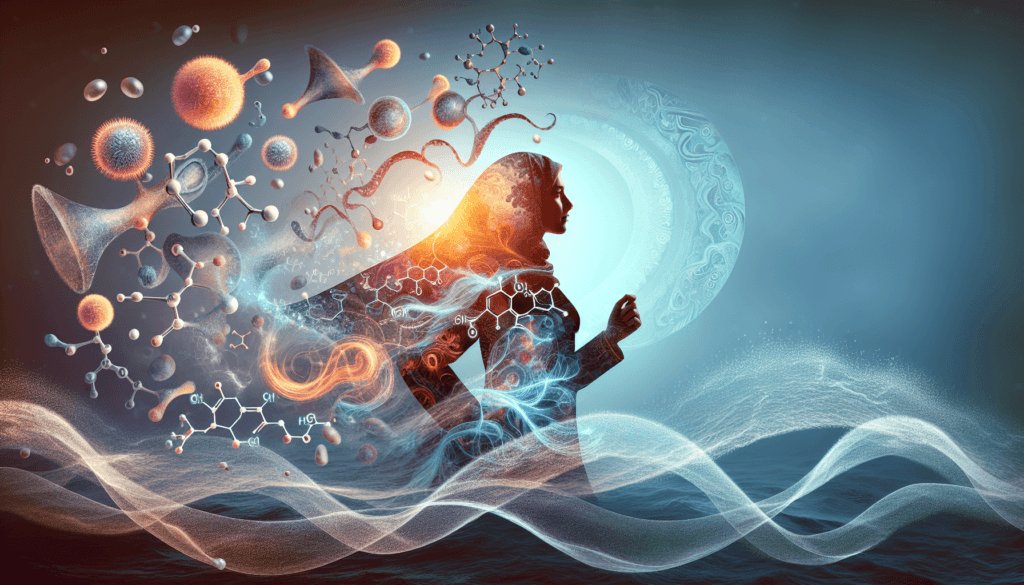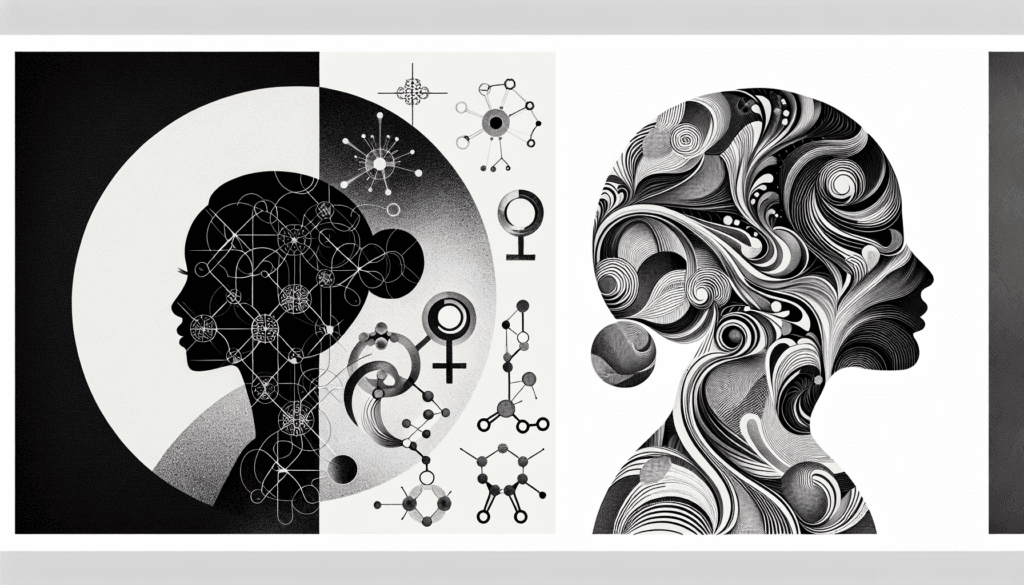Have you ever wondered what makes your body tick, particularly when it comes to those monthly cycles or sudden mood swings? Your body’s hormonal landscape is a complex and fascinating world, crucial to understanding who you are and how you function.

The Intricacy of Hormones
Hormones are extraordinary chemical messengers that zip around your bloodstream, overseeing entire operations within your body. They are orchestrators, ensuring everything runs smoothly, from growth to metabolism, reproduction to mood stabilization. Let’s take a closer look at how hormones help maintain harmony in your body.
What Are Hormones?
Table of Contents
Hormones are like little postal workers delivering messages from the endocrine glands to various organs and tissues. Each hormone has a different role and a unique strength, much like characters in a novel. They influence countless body functions and help maintain an equilibrium known as homeostasis.
The Orchestra of the Endocrine System
Think of your endocrine system as an orchestra. Each gland is an instrument contributing to the symphony that is your body’s functionality. Here’s a quick overview of the key players:
| Gland | Function | Hormones Produced |
|---|---|---|
| Hypothalamus | Connects the endocrine and nervous systems | CRH, TRH, GnRH |
| Pituitary | Regulates other endocrine glands | GH, TSH, ACTH |
| Thyroid | Metabolism regulation | T3, T4 |
| Adrenal | Stress response | Cortisol, Adrenaline |
| Pancreas | Blood sugar control | Insulin, Glucagon |
| Ovaries | Reproductive functions | Estrogen, Progesterone |
Each gland and hormone plays its part to maintain the broad spectrum of biological processes necessary for health and vitality.
The Female Hormones: A Closer Look
Within the female body, certain hormones take on even more significant roles. Understanding these are crucial because they can often explain the inexplicable — the roller coaster of emotions or changes in energy levels.
Estrogen: The Architect
Estrogen is the main female sex hormone, often seen as the architect of the body. It’s involved in crafting those unique feminine qualities — affecting everything from reproductive functions to the health of bones, skin, and heart. Estrogens are produced primarily in the ovaries but also in the adrenal glands and fat tissues.
Progesterone: The Balancer
Where estrogen is the architect, progesterone is the builder who ensures everything stays balanced. This hormone prepares the uterus for pregnancy and regulates the menstrual cycle. A delicate dance exists between estrogen and progesterone, their levels fluctuating cyclically throughout a woman’s life.
Testosterone: Not Just For Males
Surprisingly, testosterone plays a significant role within the female body, too. Though present in smaller quantities, it contributes to muscle strength, bone health, and sex drive. It’s a reminder that hormones do not work in isolation but collectively maintain the body’s integrity.
The Menstrual Cycle: A Harmonious (or Not So Harmonious) Symphony
The menstrual cycle is perhaps one of the most evident manifestations of hormonal activity in the female body and an excellent example of hormonal interplay.
Phases of the Menstrual Cycle
Menstrual Phase
- Duration: 3-7 days
- What Happens: Shedding of the uterine lining.
- Hormonal Changes: Low levels of estrogen and progesterone.
Follicular Phase
- Duration: Approx. 14 days
- What Happens: The body prepares for potential pregnancy.
- Hormonal Changes: Estrogen levels rise, leading to growth of the uterine lining and development of follicles in the ovaries.
Ovulation
- Duration: 1 day
- What Happens: A mature egg is released.
- Hormonal Changes: Surge in LH (luteinizing hormone), stimulated by peaking estrogen.
Luteal Phase
- Duration: 14 days
- What Happens: The body awaits a fertilized egg.
- Hormonal Changes: Progesterone levels rise to maintain the uterine lining, preparing for potential pregnancy.
These phases highlight the precise hormonal rhythm within your body, each stage orchestrating a series of specific physiological events.
When Hormones Go Haywire
Hormonal balance isn’t just a catchy phrase; it’s vital for health. But what happens when things go wrong? The female body is remarkably resilient, yet hormonal imbalances can significantly affect both physical and emotional health.
Symptoms of Hormonal Imbalance
Common symptoms of hormonal imbalance can include:
- Irregular Periods: A sign that hormones like estrogen and progesterone are not well-balanced.
- Mood Swings: Fluctuations in hormones, particularly estrogen and testosterone, can result in mood changes.
- Fatigue: Consistent tiredness or low energy levels may be linked to hormonal irregularities.
- Weight Changes: Sudden, unexplained increases or decreases in weight can indicate hormone issues.
Recognizing these signs is the first step towards regaining balance and understanding your body’s unique signals.
Common Causes
Causes for hormonal imbalances may vary but typically include:
- Stress: Chronic stress can lead to elevated cortisol levels, disrupting other hormone functions.
- Diet: Poor nutrition affects the production and regulation of hormones.
- Lifestyle Factors: Lack of sleep and exercise can also disrupt hormonal harmony.
- Medical Conditions: Conditions such as PCOS or thyroid disorders affect hormone levels.
Understanding the root causes of these imbalances can empower you to manage and potentially rectify them.

Hormonal Changes Across a Woman’s Lifetime
Hormonal landscapes evolve, creating different experiences and challenges at various life stages. Let’s traverse this journey to see the dynamic shifts in hormones.
Adolescence: The Awakening
Puberty marks the initiation of a series of hormonal changes, signaling the onset of reproductive capability. Higher amounts of estrogen lead to the development of secondary sexual characteristics and the commencement of menstrual cycles.
Adulthood: The Prime Time
During childbearing years, hormonal cycles are at their most regular, although pregnancy significantly alters this landscape temporarily. Estrogen and progesterone levels rise dramatically, then drop after childbirth.
Menopause: The Transition
Menopause is a natural shift marked by the end of menstrual cycles. It occurs because the ovaries gradually decrease hormone production, primarily of estrogen and progesterone. This significant change can lead to symptoms like hot flashes and mood swings. Understanding and preparing for this transition can make it more manageable.
The Benefits and Importance of Hormones
While the journey of hormones is sometimes tumultuous, the benefits they bestow are invaluable. From equipping you with what you need to create life, to maintaining your day-to-day happiness and health, the importance cannot be overstated.
Key Benefits
- Reproductive Health: Hormones ensure reproductive organs function correctly.
- Bone and Heart Health: Estrogen plays a crucial role in maintaining bone density and heart function.
- Mood Regulation: Hormones like serotonin and estrogen influence emotional well-being.
- Energy Levels and Growth: Growth hormone, along with others, keeps energy in check and assists cellular growth.
Understanding these benefits not only sheds light on how hormones impact health but also on how they influence personal identity and daily life.
Managing Hormones Naturally
While you cannot control hormonal production specifically, lifestyle choices can aid in maintaining balance. Exploring natural ways to balance these internal messengers is often a holistic approach to a healthier life.
Nutrition: Feeding Your Hormones
A balanced diet rich in nutrients supports hormone production. Foods like leafy greens, fatty fish, and seeds can support hormonal health. Also, reducing sugar and refined carbs can help curtail hormonal upheavals.
Exercise: Encouraging Harmony
Regular physical activity boosts hormone levels that contribute to well-being, such as dopamine and serotonin, and can help balance insulin levels.
Stress Management: Staying Grounded
Practices such as mindfulness, yoga, and meditation can reduce stress hormones and promote hormonal equilibrium. Prioritizing rest and relaxation nurtures both mind and body.
Seeking Medical Guidance
Sometimes natural measures aren’t sufficient, and professional guidance is necessary. If you suspect a hormonal imbalance, seeking help from healthcare professionals can guide appropriate treatment.
When to Consult a Professional
- Consistent Symptoms: When symptoms persist despite lifestyle adjustments.
- Impact on Daily Life: If hormonal issues affect quality of life or productivity.
- Chronic Health Conditions: Existing medical conditions may influence or exacerbate imbalances.
Consulting a healthcare provider could offer more targeted treatments including medication, therapy, or hormone replacement tailored to your needs.
Embracing Your Unique Hormonal Journey
Your journey through the hormonal landscape is a deeply personal one, intertwined with who you are. Understanding how these chemicals influence your body and mind can increase awareness and appreciation of their power. As you overlay life experiences with this knowledge, it fosters not just greater health but self-acceptance and a richer appreciation of your existence.
Hormones aren’t just unavoidable disturbances but essential elements that beautifully illustrate the complexity and wonder of life. Every fluctuation, every balance, tells a story — your story. Embrace it and let it guide you through your unique journey with curiosity and compassion.





